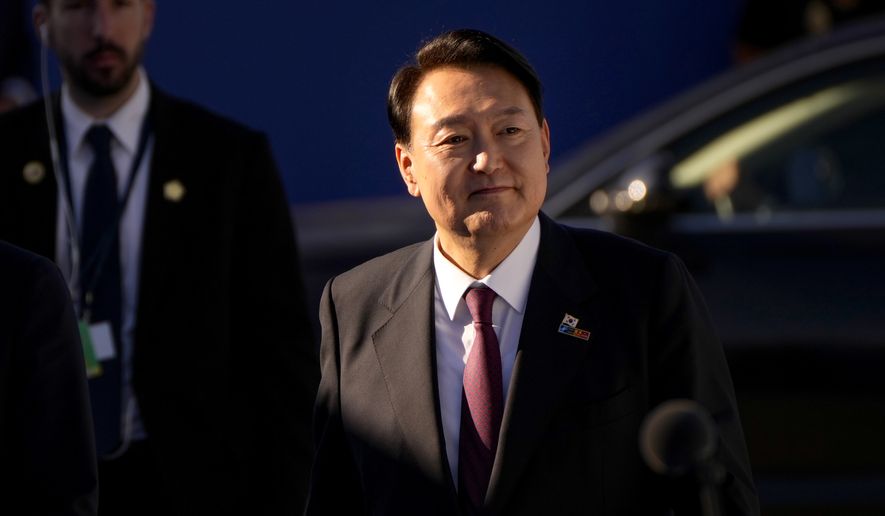Reflecting the fine line China’s Asian neighbors must walk, South Korean President Yoon Suk-yeol said his precedent-setting trip to the just-concluded NATO summit should not be seen as a shot across Beijing’s bow.
NATO leaders, in their new Strategic Doctrine adopted at the Madrid summit, for the first time labeled China a “systemic challenge” for the transatlantic alliance, and strongly criticized China’s warming ties with Russia.
Mr. Yoon’s attendance at the NATO summit as an “observer,” including a brief trilateral meeting with President Biden and Japanese Prime Minister Fumio Kishida, sparked an angry response from China, which accused NATO of seeking to extend its military influence into Asia and contain China’s rise.
It was the first time a South Korean president had attended a NATO summit, along with leaders from Japan, Australia and New Zealand.
Mr. Yoon, who took office less than two months ago, has spoken of intensifying military ties with Washington in the face of an increasingly hostile North Korea, but has also taken care not to incite China, Seoul’s biggest trading partner.
“Regarding the trilateral meeting or the NATO summit, it is not about excluding a certain country,” Mr. Yoon told reporters aboard his presidential jet returning home to South Korea Friday, according to the Korea Times. “Whenever we are dealing with domestic issues or international agendas, we should pursue a common value and protect rules that everyone should follow.”
Mr. Yoon, in Madrid, also met with NATO Secretary General Jens Stoltenberg to discuss a new cooperation agreement and the opening of a South Korea mission at the alliance’s Brussels headquarters.
Chinese officials have not been impressed by the denials that Seoul’s recent moves are not aimed at them.
“We urge NATO to learn its lessons and not to use the Ukraine crisis as an excuse to stoke worldwide bloc confrontation or provoke a new Cold War,” China’s U.N. Ambassador Zhang Jun told a Security Council meeting on the war in Ukraine earlier this week, “and not to look for imaginary enemies in the Asia-Pacific or contrive disputes and divisions.”
Foreign Ministry spokesman Zhao Lijian, asked about the presence of U.S. Asian allies at the NATO gathering, said Thursday that Beijing “will not sit idly by and do nothing if matters are harming China’s interests.”
The diplomatic tightrope Mr. Yoon is walking became even more precarious this week with a new Pew Research Center global poll that negative views among South Koreans toward China have soared and now stand at 80%, a record high.
That’s up from 31% negative views among South Koreans toward China in 2002 and 61% just five years ago.
South Korea scored the highest of the 19 nations polled - including the U.S. - on the percentage of people who worry about China’s influence on the domestic landscape.
Some 54% of South Koreans say Chinese attempts to interfere in the country’s domestic politics are a “very serious problem.”
• David R. Sands can be reached at dsands@washingtontimes.com.




Please read our comment policy before commenting.